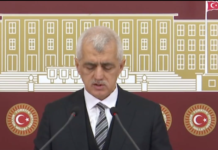Turkish government has sentenced journalist Ayşenur Parıldak, who used to work as court reporter for now-closed Zaman daily, to 7 years and 6 months in prison on Tuesday as part of its massive persecution targeting the alleged members of the Gülen movement.
Ayşenur Parıldak, a 27-year-old reporter, appeared in Ankara 14th High Criminal Court on Tuesday. Arrested on August 11, 2016 at the Ankara University’s School of Law campus, where she was also studying law, Parıldak has been charged of writing “subjective stories” as well as accusations for her Twitter messages.
Parıldak is also accused of being followed by an anonymous whistleblower on Twitter named Fuat Avni. The well-known user, who provided tips on corruption and unlawful government actions, was followed by over 2 million people and followed 180 people who are not being prosecuted on similar charges.
The court has ruled on sentencing journalist Ayşenur Parıldak, who has been behind bars for 16 months, with 7 years and 6 months prison term, and decided to kept her in jail. Prosecutor Mustafa Manga has asked the court to sentence Parıldak over her “membership to armed terror organisation.”
Rejecting that she has posted tweets with criminal content and used ByLock mobile phone messaging application, which Turkish government claims to be the top communication tool among the sympathizers of the Gülen movement, Parıldak has stated that the only crime she has committed is to work for Zaman daily. Repeating her innocence Parıldak said that “I have been so tired. I ask for my release.”
In October 2016, Parıldak wrote a letter to Cumhuriyet daily from Ankara’s Sincan Prison, talking about solitary confinement and sexual harassment, which led to a ban on letters being sent from that prison.
Parıldak, who started journalism as an intern at the now-closed-down liberal Taraf daily in 2011, also stands accused for this period since the prosecutor asserts that the Taraf daily worked for the interests of the Gülen movement.
Parıldak were released by the court on May 2, 2017 but was later re-arrested by the same court before being freed since a prosecutor objected to the initial ruling. The Oslo-based Vigdis Freedom Foundation (VFF) awarded Parıldak with its inaugural Shahnoush Courage Award last month.
Turkey is the biggest jailer of journalists in the world. The most recent figures documented by the SCF has showed that 256 journalists and media workers are in jails as of November 21, 2017, most in pre-trial detention languishing in notorious Turkish prisons without even a conviction. Of those in Turkish prisons, 230 are arrested pending trial, only 26 journalists remain convicted and serving time in Turkish prisons. An outstanding detention warrants remain for 135 journalists who live in exile or remain at large in Turkey.
Detaining tens of thousands of people over alleged links to the Gülen movement, the government also closed down more than 180 media outlets after the controversial coup attempt.
Turkey survived a controversial military coup attempt on July 15, 2016 that killed 249 people. Immediately after the putsch the ruling Justice and Development Party (AKP) government along with Turkey’s autocratic President Recep Tayyip Erdoğan pinned the blame on the Gülen movement.
Fethullah Gülen, who inspired the movement, strongly denied having any role in the failed coup and called for an international investigation into it, but President Erdoğan — calling the coup attempt “a gift from God” — and the government initiated a widespread purge aimed at cleansing sympathizers of the movement from within state institutions, dehumanizing its popular figures and putting them in custody.
Turkey’s Justice Ministry announced on July 13 that 50,510 people have been arrested and 169,013 have been the subject of legal proceedings on coup charges since the failed coup.















